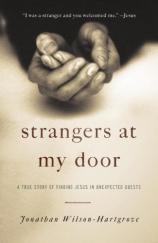Strangers at My Door: A True Story of Finding Jesus in Unexpected Guests
Review
Strangers at My Door: A True Story of Finding Jesus in Unexpected Guests
Earlier in the new millennium, Jonathan and Leah Wilson-Hartgrove founded a community and opened a hospitality house in the Walltown neighborhood of Durham, North Carolina --- white folk moving into a black neighborhood, hoping to get to know and befriend the residents and be neighborly. In a preface, Wilson-Hartgrove briefly sketches a war-time story of a Muslim doctor in Rutba, Iraq, who treated Jonathan’s wounded civilian friend. “Three days ago,” the doctor said, “your country bombed our hospital. But we will take care of you.” That Good Samaritan-style hospitality and care prompted Wilson-Hartgrove to name his community Rutba House.
It’s hard to describe the Rutba community. It is not a homeless shelter, but it does welcome people in a Benedictine sort of way, to meals and sometimes overnight. Those who live in the house permanently must agree (consensus) on who stays for very long.
"Ultimately, STRANGERS AT MY DOOR presents a refreshingly radical look at Jesus’ gospel hospitality.... Like the best books, it will give you something to think about and discuss."
Wilson-Hartgrove is first of all a good storyteller. He draws you into the lives of his many characters --- neighborhood friends and visitors to or members of Rutba House --- allowing you to understand the complex cultural and personal backgrounds that have influenced who they are, the decisions they’ve made, and where they’ve landed as young or older adults. His storytelling keeps your interest, but the stories --- several wound around one another in each chapter --- are more than breath-taking pathos (some) and breath-taking inspiration (some others).
In broadly themed chapters, Wilson-Hargrove winds his personal stories and character sketches around cultural issues: “The Prison Line” addresses the exceptionally high US incarceration rate, prison sentences meted out largely to impoverished minorities, and the controversy of death-penalty laws; anecdotally, “Beside the Healing Pool” deals with issues of mental illness; “Voices in the Wilderness” with self-proclaimed prophets, sometimes veering out of hand. There’s analysis here, often regarding racial tensions, but not presented as public policy per se. “Most of us have failed to consider homelessness for what it is; a social cancer of a wealthy and privileged society that has reduced some of its citizens to autonomous individuals. The homeless, it may well be, are all of us, exposed.” He would say the same of the addict. We’re all addicts on some level. “If we’re honest with ourselves, addiction is not an anomalous disease of the poor. Addiction is our way of life.”
Ultimately, STRANGERS AT MY DOOR presents a refreshingly radical look at Jesus’ gospel hospitality. Even if you’re sure you’re going to disagree with him, I suggest you read his narrative just because it’s a good read. Like the best books, it will give you something to think about and discuss.
Reviewed by Evelyn Bence on December 17, 2013
Strangers at My Door: A True Story of Finding Jesus in Unexpected Guests
- Publication Date: November 5, 2013
- Genres: Christian, Nonfiction, Religion & Spirituality
- Paperback: 224 pages
- Publisher: Convergent Books
- ISBN-10: 0307731952
- ISBN-13: 9780307731951




